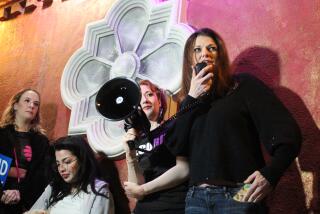Blankenship Ballet: Dance, wherever they may be
On a recent Tuesday night at Salvage Bar & Lounge in downtown Los Angeles, Bertha Suarez Blankenship, a former member of the National Ballet of Cuba, rose up on her pointe shoes and commandeered the venue’s small platform stage. She proceeded to dance a technically precise excerpt from “Swan Lake” and as cheers erupted, Shana Blake Hill, a tall, dark-haired opera singer, strode onstage in a bustier and fishnets and belted out an aria from “Carmen.”
For about two hours, members of the newly formed Blankenship Cabaret Theatre entertained some 50 people with an eclectic array of punchy song and dance numbers.
All the while, Mark Blankenship ran the show’s sound, schmoozed with the bar’s patrons between acts and in general played the part of the enthusiastic arts impresario to the hilt.
“Think of me as your arts advocate,” Blankenship says of the self that he fully embraced upon resigning from his career as a civil rights attorney in 2006. “I will tear down walls if I need to in order for artists to pursue their work.”
Billed as a Moulin Rouge-inspired fine arts cabaret, the bimonthly show at Salvage is one of several recent endeavors of the 14-year-old Blankenship Ballet Company and its 52-year-old founder and his wife, Bertha, a Cuban-born dancer who serves as the company’s artistic director.
Eschewing the more conventional model of producing full-length ballets in proscenium theaters, the Blankenships have instead pursued a uniquely hybrid mission of staging informal Cuban ballet exhibitions and cabaret-style shows in historic buildings that have often demanded significant repair.
In 2007, for example, they renovated part of a 1905 building in Venice that is shared by a Christian Science church and held community-driven cabaret performances that drew hundreds of people.
In 2009, they relocated to downtown Los Angeles and signed a long-term rental lease at the Alexandria, a once-famous 1906 hotel where presidents once made speeches but that’s now a low-income apartment building. The hotel is colorful in character but beset by unique challenges.
“When I see these beautiful rooms no longer in use, I want to cry,” says Mark Blankenship, a barrel-chested man who wears his dark hair in a long braid and waxes poetic about the “spiritual energy” he senses in historic venues.
Since launching the Blankenship Cabaret Theatre in March, the company has alternated between producing larger-scale shows in the Alexandria’s 3,600-square-foot ballroom and staging more intimate performances at Salvage, a refurbished venue on the ground floor of a landmark 1926 building downtown. The show, which will be performed this weekend at the Alexandria, features excerpts from famous ballets, a troupe of world-fusion belly dancers, opera singer Hill, a virtuosic Irish step dancer and a flamenco guitarist.
“The idea was to create a tasting menu of world-class art, to knit the features of ballet, opera and world dance like a tapestry and to put it in places where people wouldn’t normally see it,” says Blankenship during an interview in the company’s office, a former kitchen on the Alexandria’s second floor that’s jam-packed with rugs, photographs, Rococo furnishings, a piano and crystal chandeliers.
“In Cuba, we performed everywhere, at the beach, in the dirt, not just onstage,” interjects his wife, who defected in 1994 and tends to let her loquacious husband do most of the talking. “So when I came here, I started thinking about how you don’t have to be in a theater to perform good ballet.”
“We’re trying to pair virtuosity with approachability,” adds Hill, who has performed with a number of nationally recognized operas and orchestras.
“People often make snap judgments about what’s good art based on the real estate where they’re seeing the art. We’re blowing up that model by putting art in real estate that’s not specific to the arts.”
On the other hand, the Blankenships also seek to transform their second-floor ballroom with its gilded decorative elements and aura of faded elegance into a venue where other dance companies would want to present their work.
So far, they have provided low-cost rentals, co-producing arrangements and other artistic support to several Los Angeles-based choreographers, including Maria Gillespie, Meg Wolfe and Rosanna Gamson, who just presented a preview of her latest dance-theater work, “Layla Means Night,” in the space.
“Mark genuinely wants to help the dance community of Los Angeles, and he has a lot of generosity,” says Gamson, who likens Blankenship to a “circus master that wants to have all three rings going while standing in the center in shiny boots.”
Gamson observes that although Blankenship gave her the freedom to do what she wanted with the ballroom, she also encountered logistical challenges at the Alexandria, where renovated apartments and the foodie restaurant the Gorbals coexist with abandoned rooms that are victims of urban decay.
For Wolfe, who rehearsed and presented several shows there for a period of about a year, “the space is magical, but there’s a lot of work involved in using it. The power blows out, you have to carry your lights in and out ... it can be a problematic place to work,” she says, taking care to note that “Mark’s heart has always been in the right place.”
Blankenship concedes that his job can sometimes be “thankless and challenging.”
He recalls the day he showed up to his office and saw that someone had defecated on the hallway carpet. Or the time one of his treasured chandeliers was stolen and the doors to the ballroom “were torn in half.”
“The hard thing about this space is that you see progress and then you come in the next day and it’s been destroyed,” he says. “Some days, things just don’t work right. But it doesn’t matter because you’re continuing along with a vision that inspires you.”
Ultimately, Blankenship seems professionally and personally driven by five words: The show must go on. “You know that song, ‘Live Like We’re Dying’? Well, that’s how I practiced law and now I feel that way about producing art,” he says.
“This is how I try to vanquish barriers between people and build community.”
Contact: (866) 922-5538 or blankenshipcabarettheatre.com
More to Read
The biggest entertainment stories
Get our big stories about Hollywood, film, television, music, arts, culture and more right in your inbox as soon as they publish.
You may occasionally receive promotional content from the Los Angeles Times.






